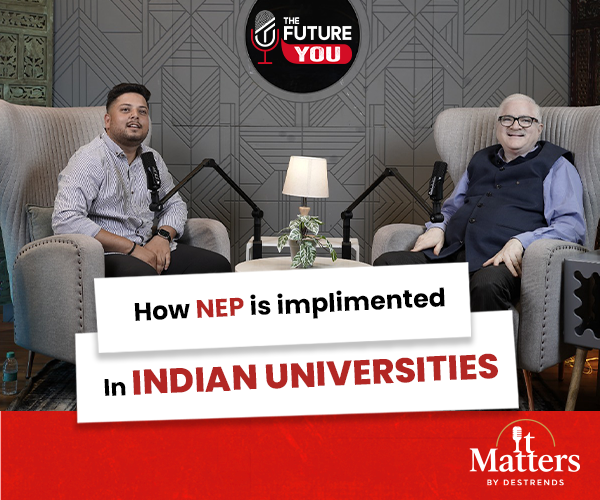Have a Question? Let’s Talk!
Got something on your mind? Drop your question below — our team is here to help and will connect with you shortly.
Follow Us On
EPISODE 1 :From Policy to Practice: How NEP is implemented in Indian Universities

Education reforms also possess the power to change nations, but the real power lies in the application of these reforms. In India, the newly approved policy, which is termed NEP 2020 , may be perhaps the most controversial education plan in the history of the country. It signals the beginning of a whole revolution in all the learning systems in the country and its establishment within the global competitive agenda. Such reforms are not mere words on paper at Vivekananda Global University (VGU), Jaipur; they are lived, enacted, and breathed every single day in the classrooms, a student's experience, and campus culture.
Creating a Learner–Oriented Environment
In VGU, classrooms are about students and not the limitations of a fixed syllabus.
Facilitators do not teach; they guide and mentor the students to help them learn. This allows the students to develop at their own pace. This is because they have such innovative solutions as individualized assistance, project-based learning, and digital teaching, which enhance the classes and restore their relevance.
In the context of higher education , this curriculum encapsulates all learning and teaching arrangements as well as incorporates changes necessary for the attainment of objectives in the incessantly globalized world. The curriculum is appropriate for most of the Department-supported Academic Affairs initiatives since it constructs and allows the students to go through every option for completing the course, irrespective of who is responsible or carrying out the task.
Emotional and Moral Learning
The word education is not simply about knowledge; it involves character building as well. VGU takes great care in nurturing emotional intelligence and ethics by way of training sessions, leadership, and ethical challenges for the students. Also, children acquire skills of resilience, compassion, and accountability that are rare but necessary to the development of future leaders.
This philosophy is also rooted in the heritage of India, where education is not confined to books alone but nurtures a person as a whole from all aspects. Traditional learning prevents today’s graduates from losing touch with humanity and social values.
Greetings from the Future – Present
Some of the most significant components of NEP 2020, which stress the ability even of undergraduate students to select courses of their choice based on one’s interests and capacities, will involve integrated education involving the faculties of various disciplines and the development of kinaesthetic skills of the individuals.
Since this will be a new curriculum and an education plan for rotating grades , it cannot be compared or contrasted with the previous grade-level curricula to be given for education in higher education. A comparative content analysis of the present and the previous one should be done only after prior development of this new system and conceptualisation of the content inside. More specifically, in the new education policy operationalized for the first 5 years, i.e., during 2020–2025, no restructuring of this nature would be felt, and the consequent assessment will also seldom be dependent on the strategies for the national education policy 2020.
The promise VGU has kept to its students is that traditional norms and modern-day norms shall never conflict. In fact, they shall complement each other in ensuring that every student is cultured and ready to face the world. Yoga, meditation, and even teamwork are practiced daily as they combine discipline and balance. At the same time, students are provided with advanced laboratories, classrooms equipped with artificial intelligence, and, finally, a self-employment cell, among other essentials.
Flexibility, International Benchmarks, and Sustainability
The university adopted a homogeneous credit system where a student can build his or her own programs. Such cross-disciplinary programs include students in various professions without incurring any extra costs. In this way, inclusion is provided with preparation for global standards.
To align with the ideas comprising the new education policy, the VGU also emphasizes environmental and social activities. Whether it is environmental or social activities, the students conduct purposeful learning. Education of good quality is open to more people because it is not expensive.
Bringing It All Into Practice
The NEP 2020 provides for integrated education, excellence, and enhancement. The education plan at VGU incorporates all the above into practice, thus providing solutions rather than dreams. The described model of a university negates any such approaches as this academic leadership by striking a balance between experience and tradition, progress and equity. Therefore, any academic policy can be implemented as mechanical changes.
Students seeking admission to VGU and higher education in general, let it be known that possession of a degree is not the only guarantee of a better tomorrow, but rather an optimum person will be crafted. This is how Indian academic institutions are implementing government policies, ensuring that the organized changes are eventually seen to be beneficial to all learners, as well as to the rest of society.
Also, according to NEP 2020, the school education plan should remain focused on improving foundational literacy and numeracy, which includes improved transition ratio and retention of students.
The sky is the limit when we talk about the NEP. This could be achieved through in-depth infrastructure reforms. Enhancing specific goals, such as increasing enrollment levels amongst children and reducing dropouts, in order to participate in higher education. Emphasizing the new education policy was to unite the existing policies in the same standard framework.
With the proportion of utility changes, interventions, and initiatives still within the scope of process application, the goals of the national education policy 2020 were to amend these ‘evolution policies’ through research findings and practical engagement